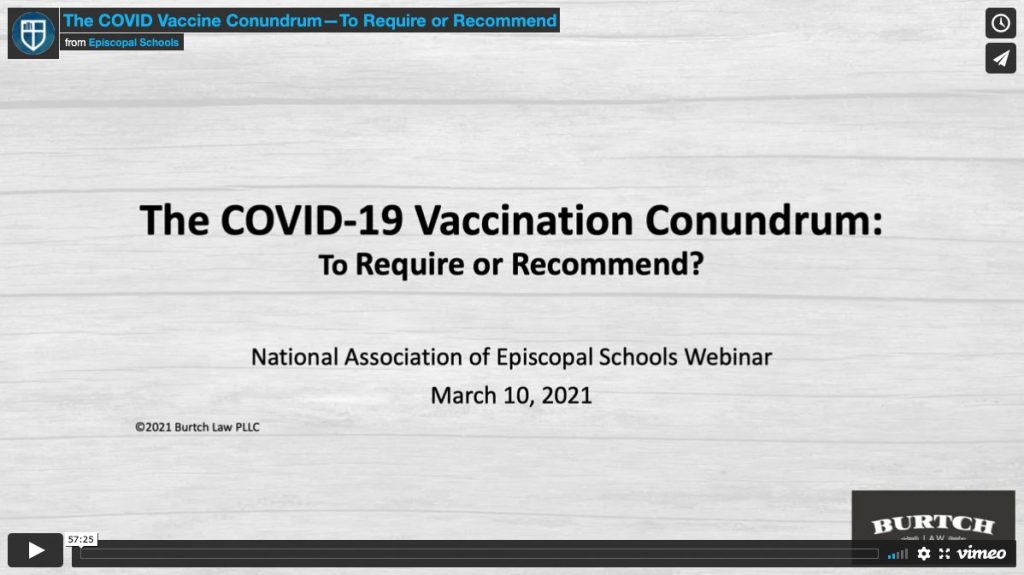Watch Webinar: The COVID Vaccine Conundrum—To Require or Recommend (Members)

New Round of COVID-Related Financial Assistance for Schools
On December 21, 2020, Congress authorized two major pieces of federal legislation to provide financial assistance to small business and to schools:
- The Paycheck Protection Program (PPP) was renewed.
- A $2.75 billion Emergency Assistance to Non-Public Schools (EANS) program was established.
Schools may not accept aid from both the EANS program and the new round of the Paycheck Protection Program (PPP). (Schools that received a PPP loan prior to December 27, 2020 will still be eligible to participate in EANS).
Detailed guidance is below. NAES urges schools to consult with appropriate professionals regarding risks or requirements of participating in either program.
Overview of Legislation
- Independent School Management
The New Stimulus Package and Your School—Round 2
Paycheck Protection Program Renewed
$284 billion was authorized for a second draw of Paycheck Protection Program loans to small businesses. The program will be phased in starting the week of January 11.
Borrowers are eligible for a second-draw PPP loan of up to $2 million, provided they have 300 or fewer employees and can demonstrate that their gross receipts in any 2020 quarter are at least 25% less than the same 2019 quarter.
In order to receive full loan forgiveness, borrowers must use at least 60% of the loan for payroll costs and not more than 40% for non-payroll costs.
Schools that accept a second draw of PPP are not eligible for the Emergency Assistance to Non-Public Schools program.
Source: CAPE Outlook, January 2021 (Council for American Private Education)
Detailed guidance:
- Venable LLP
SBA Releases Applications and Issues New Guidance for First Draw and Second Draw PPP Loans - Small Business Administration
SBA and Treasury Announce PPP Re-Opening; Issue New Guidance - Small Business Administration
Paycheck Protection Program Second-Draw Loans (PDF) - PKF O’Connor Davies, LLP
SBA Releases New PPP Loan Application Forms
Emergency Assistance to Non-Public Schools (EANS) Program
The December 21 legislation establishes a new $2.75 billion Emergency Assistance to Non-Public Schools (EANS) program in the form of state-based grants to schools to defray COVID-related costs.
- The governor of each state will have until February 8, 2021 to apply for that state’s share of the funds.
- Each state’s State Educational Agency (SEA) will administer the program.
- Each state’s allotment is determined by the number of children at or below 185% of poverty attending private schools in that state.
- Each SEA “shall prioritize services or assistance to non-public schools that enroll low-income students and are most impacted by the qualifying emergency.” This gives SEAs considerable room for interpretation.
- The law requires SEAs to make a good faith effort to quickly process private schools’ applications and to provide the assistance.
- The law spells out the variety of ways the funds can be used.
As noted by the Council for the American Private Education, “Crucially, the bill is written such that a public agency will maintain control of funds in much the same way as occurs with existing equitable services programs. This should, in theory, insulate private schools from becoming recipients of federal financial assistance. The bill also allows schools to be reimbursed for certain past expenses. Depending on what is being reimbursed, such reimbursements could constitute federal financial assistance.”
NAES urges schools to carefully consider the risks and requirements related to accepting funds under the EANS program.
EANS Program Details and Guidance
- US Department of Education
Emergency Assistance for Non-Public Schools (EANS) - US Department of Education
EANS FAQs
Legal Guidelines for Vaccination
Related Resource: The Episcopal Church Vaccination Toolkit
As COVID-19 vaccination becomes more widespread, a common question for schools is whether or not vaccination can be required for students and/or employees. The U.S. Equal Employment Opportunity Commission (EEOC) recently issued some new guidance that should inform schools’ decision making.
Currently, that guidance indicates that yes, with some exceptions, schools can require vaccinations for students and employees. It should be noted that EEOC guideline can change—particularly with a change of administration.
Full Overview of Guidelines
- Venable, LLP
The COVID-19 Vaccine: Guidance for Independent Schools - Fisher Phillips
Vaccine Resource Center For Employers